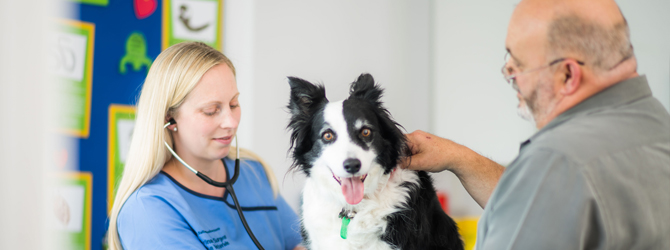How do I choose a vet? Top tips to select a local vet that’s right for you and your pet
First Published: 21/06/2018
Last Updated: 29/04/2024
Whether you’re welcoming a new pet to your family or you’ve moved to a new area, choosing the right local vet is a big decision. After all, your pet’s well-being is at stake. We’re here to help you make the right choice for you, your family and – of course – your pet.
Talk to friends and colleagues
It’s always a good idea to ask family, friends and colleagues with pets for advice. People love to share their experiences, and word of mouth and recommendation are great ways to learn about other people’s experiences with vets in your local area.
Do your research
Once you’ve gathered together a few recommendations, check them out online using Google (or your preferred search platform), review sites such as Trustpilot, and social media sites such as Facebook.
Reading through reviews will help you narrow down your selection – you may then decide to call or visit a couple of local vets for yourself, to judge how friendly, caring and professional the veterinary staff are before you make your choice. This is your chance to ask any questions, such as how long they’ve been established, what services they provide, how much they charge for those services, and what hours they’re open.
All UK vets should be qualified and registered with the Royal College of Veterinary Surgeons (RCVS), and will have either MRCVS or FRCVS after their name.
Things to think about when choosing a vet
Other things to consider include:
- Are they in a convenient location, easy to travel to and close to your home?
- Do they have a friendly, caring and professional manner?
- Are they qualified, knowledgeable and experienced?
- Do they provide both daytime and out-of-hours care for your pet?
- Is their surgery and reception area clean and tidy?
- Do they explain things in a way that’s easy for you to understand?
- Is there parking close by, or good public transport links?
Trust and communication
It’s really important to find a vet you can trust with the care of your pet, so look for a veterinarian who’s caring, friendly, sympathetic and professional. It’s worrying enough to have a poorly pet without feeling like you don’t understand what’s going on, so good communication skills and knowledge are also vital.
Help! I need a vet near me! Find a local vet, fast
If you need advice, treatment or care for your pet, enter your postcode in the link below for details of your nearest veterinary service. (The search facility works best when you have location services switched on in your internet browser.)
“Word of mouth and recommendation are great ways to learn about other people’s experiences with vets in your local area.”
All our friendly, knowledgeable vets and vet nurses are fully trained in pet care. If you have any worries or concerns about your pet’s general health or wellbeing, call your local vet and book an appointment to get them checked out.
Our local vets also offer an emergency out-of-hours service, so they can provide treatment and care outside of daytime hours should your pet have an accident or become ill, and need emergency medication or treatment.
Need care, treatment or advice for your pet?
Our vets treat thousands of family pets every year, and our friendly, expert vets and vet nurses are on hand with advice and information when you need us most.
Find your nearest vet using our Find a Vet page, or speak to a vet online using Online Vets. You can find out more about visiting a vet here.
